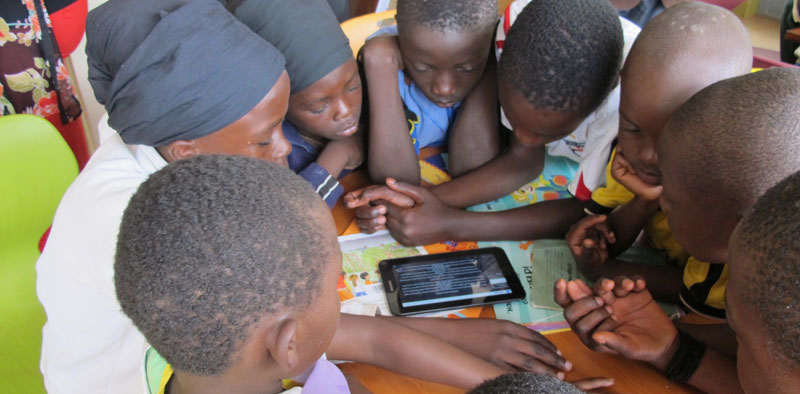The programme under the SCIENCE & TECHNOLOGY series is about using technology in the learning process right from primary school. The episode which was filmed in Kenya, Ghana and South Africa, shows the presenters meet the entrepreneurs and teachers who are using new advances in technology to accelerate literacy and learning in Africa.
In Kenya, the government has designed a curriculum for all Primary Schools. And the educators are using is an interactive educational platform called eLimu (read e-learning), designed with a rich digital localised content for the Primary Schools. eLimu application ‘vamps up educational content with locally produced and culturally relevant videos, animations, songs, music, games and quizzes to improve learning and assessment outcomes.’
The educators in Kenya are using easy-to-use, low cost tablets in primary schools to advance literacy and learning fast and in an interesting and entertaining manner. The children are given the liberty to freely use their tablets to explore and to understand the content on their tablets.
And there is no doubt that the school children enjoy using their tablets in an interactive manner with their fellow classmates. Children are tested competing to complete questions in record time and the winners are shown expressing their happiness at their success.
The segment about Ghana under the same episode of Innovate Africa, the presenters introduce to the viewers ‘a robot builder, entrepreneur, TV presenter and teacher’ called Ben Nortey. Ben Nortey is introduced as the founder and CEO of the Metro Institute of Innovation and Technology in Ghana who leads an extracurricular coding course for children of all ages in order to spread his passion for robotics.
Nortey scavenges around garbage dumps picking that he deems useful in making robots, and he then engages his classes to make robots that run errands. The documentary shows his cargo-lifting robots, and it shows one student who says he would like to make a robot that can save people from burning buildings. Very serious and impressive staff these kids are able to do in as far as digital innovation and design are concerned! And they are making for their class exercise, robots for different purposes.
And Nortey has instilled in them the competitive spirit as it relates to technological success. He fondly talks of Identifying passion early and placing the students the right places where children can happily grow into fields of their love and liking. He talks of identifying and developing the talents the children exhibit during their early years. And he believes that Africa will only develop and be able to compete with the rest of the world if it invests heavily in advancement of science and technology.
In South Africa, they have already advanced in e-learning. One educator talks of ‘a long time ago’ when she and other school children used to carry back-breaking bags full of books, and how today all the children carry their e-books.
This statement from a young lady now teaching at her old school in a rural setting, starkly contrasted with how far behind Uganda is in modern literacy and learning because our students at all levels, still carry back-breaking bags full of text and exercise books.
What was more telling about the gap between those and us, was how South Africa, which is already advanced in e-learning, having realized the policy of ‘no child left behind’, and aware many areas have no access to electricity, they went further to build solar-powered containers that are distributed to rural areas where children are enabled to use computer tablets provided to them department of education.
Curriculum is designed uniformly by government, in line with the e-learning revolution, and Digital learning is mandatory for all teachers. Now, at what stage in this e-learning revolution are we in Uganda?








